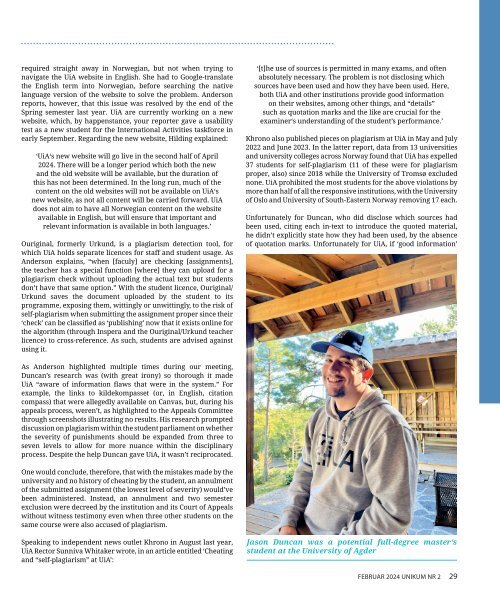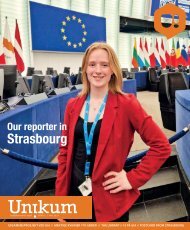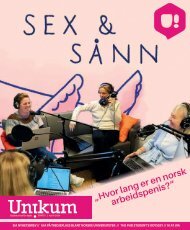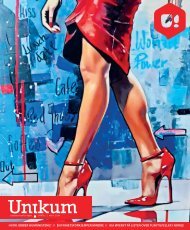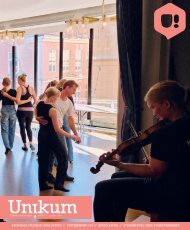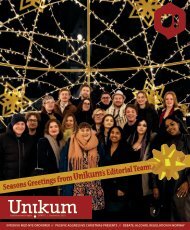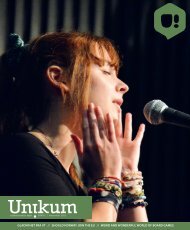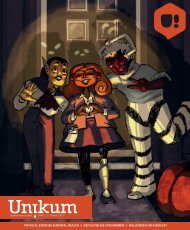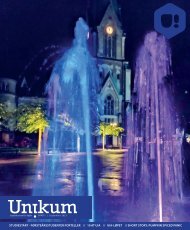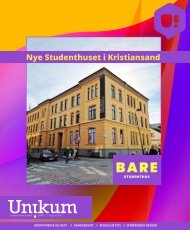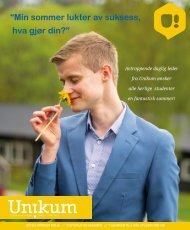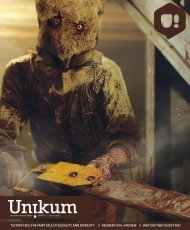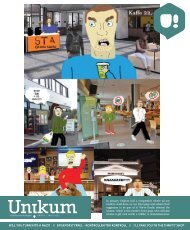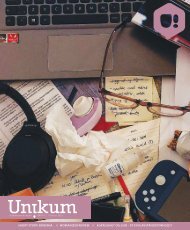FEBRUARY24_UNIKUM_WEB
You also want an ePaper? Increase the reach of your titles
YUMPU automatically turns print PDFs into web optimized ePapers that Google loves.
equired straight away in Norwegian, but not when trying to<br />
navigate the UiA website in English. She had to Google-translate<br />
the English term into Norwegian, before searching the native<br />
language version of the website to solve the problem. Anderson<br />
reports, however, that this issue was resolved by the end of the<br />
Spring semester last year. UiA are currently working on a new<br />
website, which, by happenstance, your reporter gave a usability<br />
test as a new student for the International Activities taskforce in<br />
early September. Regarding the new website, Hilding explained:<br />
‘UiA‘s new website will go live in the second half of April<br />
2024. There will be a longer period which both the new<br />
and the old website will be available, but the duration of<br />
this has not been determined. In the long run, much of the<br />
content on the old websites will not be available on UiA‘s<br />
new website, as not all content will be carried forward. UiA<br />
does not aim to have all Norwegian content on the website<br />
available in English, but will ensure that important and<br />
relevant information is available in both languages.’<br />
Ouriginal, formerly Urkund, is a plagiarism detection tool, for<br />
which UiA holds separate licences for staff and student usage. As<br />
Anderson explains, “when [faculy] are checking [assignments],<br />
the teacher has a special function [where] they can upload for a<br />
plagiarism check without uploading the actual text but students<br />
don’t have that same option.” With the student licence, Ouriginal/<br />
Urkund saves the document uploaded by the student to its<br />
programme, exposing them, wittingly or unwittingly, to the risk of<br />
self-plagiarism when submitting the assignment proper since their<br />
‘check’ can be classified as ‘publishing’ now that it exists online for<br />
the algorithm (through Inspera and the Ouriginal/Urkund teacher<br />
licence) to cross-reference. As such, students are advised against<br />
using it.<br />
‘[t]he use of sources is permitted in many exams, and often<br />
absolutely necessary. The problem is not disclosing which<br />
sources have been used and how they have been used. Here,<br />
both UiA and other institutions provide good information<br />
on their websites, among other things, and “details”<br />
such as quotation marks and the like are crucial for the<br />
examiner‘s understanding of the student’s performance.’<br />
Khrono also published pieces on plagiarism at UiA in May and July<br />
2022 and June 2023. In the latter report, data from 13 universities<br />
and university colleges across Norway found that UiA has expelled<br />
37 students for self-plagiarism (11 of these were for plagiarism<br />
proper, also) since 2018 while the University of Tromsø excluded<br />
none. UiA prohibited the most students for the above violations by<br />
more than half of all the responsive institutions, with the University<br />
of Oslo and University of South-Eastern Norway removing 17 each.<br />
Unfortunately for Duncan, who did disclose which sources had<br />
been used, citing each in-text to introduce the quoted material,<br />
he didn’t explicitly state how they had been used, by the absence<br />
of quotation marks. Unfortunately for UiA, if ‘good information’<br />
As Anderson highlighted multiple times during our meeting,<br />
Duncan’s research was (with great irony) so thorough it made<br />
UiA “aware of information flaws that were in the system.” For<br />
example, the links to kildekompasset (or, in English, citation<br />
compass) that were allegedly available on Canvas, but, during his<br />
appeals process, weren’t, as highlighted to the Appeals Committee<br />
through screenshots illustrating no results. His research prompted<br />
discussion on plagiarism within the student parliament on whether<br />
the severity of punishments should be expanded from three to<br />
seven levels to allow for more nuance within the disciplinary<br />
process. Despite the help Duncan gave UiA, it wasn’t reciprocated.<br />
One would conclude, therefore, that with the mistakes made by the<br />
university and no history of cheating by the student, an annulment<br />
of the submitted assignment (the lowest level of severity) would’ve<br />
been administered. Instead, an annulment and two semester<br />
exclusion were decreed by the institution and its Court of Appeals<br />
without witness testimony even when three other students on the<br />
same course were also accused of plagiarism.<br />
Speaking to independent news outlet Khrono in August last year,<br />
UiA Rector Sunniva Whitaker wrote, in an article entitled ‘Cheating<br />
and “self-plagiarism” at UiA’:<br />
Jason Duncan was a potential full-degree master‘s<br />
student at the University of Agder<br />
FEBRUAR 2024 <strong>UNIKUM</strong> NR 2 29


